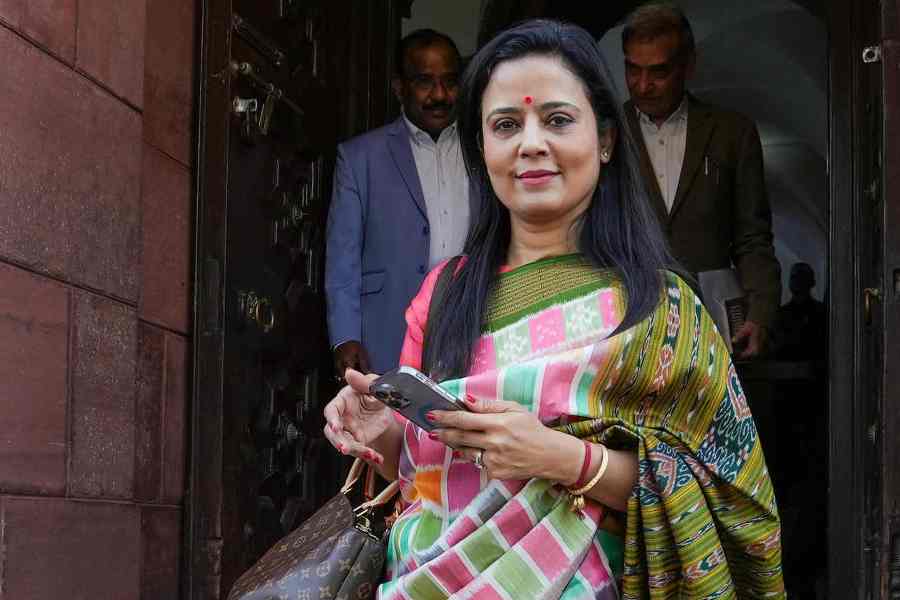The Lok Sabha's Ethics Committee on Thursday held Mahua Moitra guilty of "unethical conduct" and "contempt of the House" for accepting gifts and sharing her Lok Sabha login credentials with an unauthorised person, and recommended her expulsion.
The expulsion will come into effect only when the winter session of Parliament begins on December 4, giving the Trinamul Congress MP nearly a month more as Lok Sabha member.
Opposition members said her expulsion had been a foregone conclusion from the start of the proceedings. "It was all scripted," a member of the ethics panel said.
The draft report was adopted at a short meeting of the panel with six members, including Preneet Kaur of the Congress, voting for Moitra's expulsion and four against. Kaur is the wife of Amarinder Singh, the former Congress chief minister of Punjab who is now with the BJP.
There will be dissent notes from all the other Opposition members on the 15-strong panel, including Uttam Kumar Nalamada Reddy of the Congress, in the report to be presented to the Lok Sabha Speaker. Reddy failed to make it to the meeting in connection with the filing of nominations for the Telangana Assembly elections.
The report on the cash-for-query allegations will be tabled in the Lok Sabha when the winter session begins. Following this, the government will move a resolution for Moitra’s expulsion.
The expulsion will in itself not bar Moitra from contesting the next Lok Sabha elections, due next summer. But the committee has also recommended that the government probe the “money trail” of transactions between Moitra and businessman Darshan Hiranandani (who has submitted an affidavit supporting the complaint that she accepted expensive gifts from him).
While recommending this, the committee conceded that it did not have the technical wherewithal or expertise to investigate and unearth the money trail.
Anyone convicted in a criminal case and sentenced to two years or longer in jail is debarred from contesting any election for six years, to be counted from the day they have finished serving their sentence.
The ethics panel has wrapped up the inquiry with record speed — in three sittings.
On October 26, lawyer Jai Anant Dehadrai — who set the ball rolling with his complaint, which was taken up by BJP member Nishitant Dubey — was called to present oral evidence. Moitra was called to present her version on November 2, and the report was finalised on November 9.
According to the report, the committee looked at two broad aspects of the matter —ethics and criminality.
It added to its mandate a rap for member Danish Ali of the BSP for “unruly conduct and spread(ing) rumours” during the proceedings.
While recommending Moitra’s expulsion, the committee described her behaviour as “highly objectionable, unethical, heinous and criminal”, and said the government needed to probe it.
The report accuses Moitra of dwelling on her personal relationships with Dehadrai and Hiranandani during her deposition, using these to digress from her “unethical conduct” as MP.
On November 2, Opposition MPs and Moitra had walked out of the meeting of the committee after three hours, accusing chairman Vinod Kumar Sonkar of dwelling too much on personal aspects of the case.
The Opposition MPs have contested the contentions in the report, terming the inquiry process a “farce” and alleging it reflected a “kangaroo court”.
In his dissent note, CPM member P.R. Natarajan is understood to have asked why an unsubstantiated allegation from an interested party was referred to the committee.
Other Opposition members have underlined that Moitra’s deposition was not completed as no one other than the chairman got a chance to question her. Nor did the committee cross-examine Hiranandani.
At the November 9 meeting, Opposition members stressed that the voluminous report did not include minutes of the October 26 meeting, where they had questioned the procedure adopted by the chairman in this case — of calling the complainants to present oral evidence first.
The Opposition’s objections apparently went unheeded as the chairman decided to go ahead with adopting the report, maintaining that this was the one-point agenda for the day.
Later, Sonkar — while briefing journalists outside — refused to divulge what the recommendation was, citing procedure, but said the report was adopted by a majority vote.











